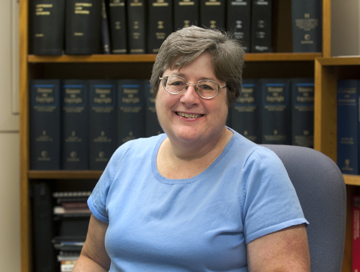Purdue Profiles: Donna Ferullo

Donna Ferullo, director of University Copyright Office. (Purdue University photo/Mark Simons)
Music, academic journals and tattoos actually have something in common. They are all protected by U.S. Copyright law.
The answer may be surprising, but that's not cause for worry. Donna Ferullo, director of the University Copyright Office, is here to inform and educate faculty, staff and students about the delicate balance copyright laws present to those in higher education.
Since 2000, Ferullo has been working at Purdue to shine a positive light on the often negative perception of copyright. Assisting with research, articles and multimedia pieces from videos and songs to novels and artwork, she translates law into advice for those in need.
What is it about copyright that most interests you?
Copyright has tentacles in every part of our lives, even those areas we might not realize. The laws are in place to allow us to do a lot of different things, but people get scared of lawsuits or of using something incorrectly, so they don't bother moving ahead with a great idea. My thought was that in education, especially higher education, there is so much more faculty, staff and students could be doing if copyright was better understood. My job is to help everyone follow the law while they move forward with creating new works and projects.
What does your role at the University Copyright Office entail?
I work with faculty and staff on classroom and teaching issues, whether it's using a video in class or posting a copyrighted work to Blackboard. I want to ensure that faculty, staff and students can legally accomplish their ultimate goals for a project. I also advise faculty, staff and students not only on the use of other people's copyrighted works, but also on how to manage their own copyrights. It's important for the Purdue community to understand their rights as authors, particularly when they are entering into publishing contracts.
I do a lot of guest lecturing and presentations in classes and within campus departments. I send out brochures on general copyright and author rights at least once each year to the campus. I try to get the information out there any way I can whether it's through print materials, presentations, individual consultations or the University Copyright Office website.
I also travel about once each month giving presentations across the country. It's great to get out there and see what other people are doing and the copyright issues other institutions are grappling with. I've even had the opportunity to go to Capitol Hill to testify about different aspects of copyright legislation and how that might impact higher education.
What is your favorite part of your job?
I like that I can help people accomplish what they hope to, whether it's in teaching, research or assisting them in managing their copyright. It's very rewarding to assist in facilitating the creative process from the inception of the idea to the development of the work.
Have there been any projects that are memorable for you?
One of the major and ongoing projects is increasing copyright awareness around campus. Over the years, I've seen an incredible amount of interest in copyright issues from all areas of campus. Digital initiatives and copyright issues associated with them have certainly brought to the forefront the importance of understanding copyright law and its applications.
Is the University Copyright Office currently working on any initiatives?
I'm currently working with the Purdue Libraries and Purdue University Press to inform our campus about copyright issues involved in adopting an open access policy at Purdue. This involves increasing awareness among authors about the terms of agreements they are signing with publishers, so even if the author does transfer the copyright to the publisher, they retain some rights. When publishing agreements allow faculty and students to deposit their scholarly, peer-reviewed journal articles into open access repositories, such as Purdue e-Pubs, they are increasing worldwide access to their work. This is a win-win situation.
What should everyone know about copyright laws?
Contrary to what many may believe, copyright is very flexible. It should not be seen as a barrier to creating new works or to using copyrighted works. The essence of the U.S. Copyright law is to encourage people to create new works. The purpose is to balance the rights of owners who have already created something with the rights of the public to use those works. Each instance of copyright is very situation specific, so there is not a universal "yes" or "no." All those that I've worked with know that my first response to their copyright question begins with "It depends."
